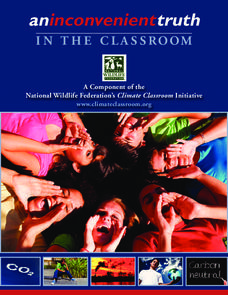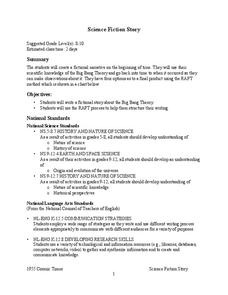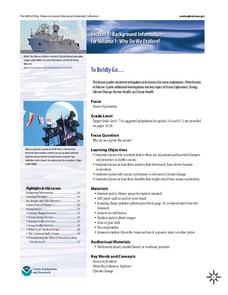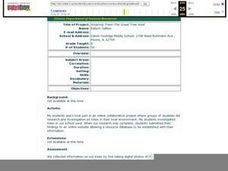National Wildlife Federation
An Inconvenient Truth in the Classroom
Global warming — what a hot topic! A thorough unit challenges learners to research, read, explore, and write about carbon, its role and increasing nature in our atmosphere, and how global warming is affecting lives and environments...
NASA
Science Fiction Story
A lesson allows you to go back in time and see the big bang actually happen. Bazinga! In reality, pupils research the Big Bang Theory and theorize what it would be like to go back in time and see it happen. There are four...
Curated OER
Ornithology and Real World Science
Double click that mouse because you just found an amazing lesson! This cross-curricular Ornithology lesson incorporates literature, writing, reading informational text, data collection, scientific inquiry, Internet research, art, and...
Curated OER
Life in a Hurricane Zone
Students research the effects of living in a hurricane zone. In this hurricane zone lesson, students research the impact of natural disasters on humans and the environment, and write a press release describing the devastation of...
National History Day
Helping Life and Aiding Death: Science, Technology, and Engineering at Work during World War I
Science, engineering, and United States history? Pupils research collections of artifacts from the Smithsonian to learn about historical scientific innovations. At the end of the lesson, they write an essay to discuss technology's...
Institute of Electrical and Electronics Engineers
Biomimicry in Engineering
Take a look with your class at how nature supplies inspiration to engineers. In cooperative groups, youngsters research biomimicry and then develop a system that would help support people living on the moon. Each team also considers...
Missouri Department of Elementary
Equine Science
Did you know that horses have two sets of teeth? There is much to learn about horses, of course, and those interested in equine science will learn much from a 10-lesson agricultural science course that covers not only equine dental...
BioEd Online
Spiders in Space
Does a spider spin its web differently in space? What other ways might microgravity affect an arachnid? Pick a topic to research, plan an investigation, and follow astronauts on the International Space Station as they perform some of the...
University of Minnesota
Mirroring Emotions
Do you ever give your class the "teacher look"? Without saying a word, they become silent and engaged (hopefully). How do they know what you're thinking? Explore the concept of nonverbal communication and how it relates to our...
Curated OER
E.T., Are You Out There?
Research the necessary components of a planet that supports life after reading the article "All of a Sudden, The Neighborhood Looks a Lot Friendlier" from The New York Times. After finding their information, middle and high schoolers...
Curated OER
Canada's Role in Astronomy and Space Science
Ninth graders, in groups, research a Canadian astronaut, developing a profile of their astronaut for presentation in a learning center. They visit the other groups' centers to explore more astronauts.
NOAA
To Boldly Go...
When we think of ocean exploration, many of us have visions of sunken pirate ships full of treasure or mysterious creatures of the deep. What really motivates deep-sea investigation? The first in a series of diverse six-part lessons...
Curated OER
Planets in Our Solar System
Each member of a four-student group takes on a specific aspect of an assigned planet to research. After gathering information, the team works together to create a travel brochure and a presentation intended to convince other classmates...
Curated OER
Wildlife Variety Show: Biodiversity In Illinois
Eighth graders write a short report in first person about any plant or animal found on a list of Illinois species. They become the character of the plant or animal and give a short report describing the plant or animal.
Curated OER
Science: The Great Tree Hunt
Sixth graders participate in an online, cooperative project researching trees in their local environments for use in an online knowledge game. They take digital pictures of the trees, bark, and leaves. After completing their research,...
NOAA
Watch the Screen!
Can a sponge cure cancer? Life science pupils visit the drugstore under the sea in the fifth lesson of six. Working groups research the topic then get hands-on experience by testing the inhibiting effects of several plant extracts...
Curated OER
Investigate Science Using Crayfish
Young scientists discover the importance of scientific investigation by observing live crayfish. They carefully observe the patterns of crayfish in different environments. Then they discuss their conclusions and define what all living...
Curated OER
Survival in Antarctica
Explore the harsh climate of Antarctica and its wildlife. Participate in experiments to determine how humans survive in the continent's climate, and address the difficulties faced by scientists.
EduGAINs
Go H2O! Investigating Residential Water Systems
Before your learners excuse themselves to get a drink at the water fountain, prompt them to think about where that water comes from. A middle school science lesson encourages groups to research their community's source of drinking water,...
Curated OER
Using MY NASA DATA to Determine Volcanic Activity
Students explore how aerosols are used in science to indicate volcanic activity and how biomass burning affects global aerosol activity. Students access data and import into MS Excel using graphical data to make inferences and draw...
University of Chicago
Exercise in Conflict Resolution
How do major religions, including Judaism, Christianity, and Islam, differ in how they view the role of individual freedoms within society, the definition of morality, and the importance of politically satisfying the greater...
Polar Trec
Why Can’t I Eat This Fish?
Can turning on the television lead to toxins in the food supply? The lesson offers an opportunity for young scientists to complete guided research. A worksheet lists each question as well as the web page necessary to answer the question....
Curated OER
Dig In
Students identify where vegetables originate from. In this agriculture lesson, students use a search engine to find out where certain vegetables originate from. Students plot the information onto a world map.
NASA
Unsung Heroes of Science
Scholars research scientific heroes who haven't been given enough credit for their discoveries. While many are women, there are also men to whom credit is overdue.























